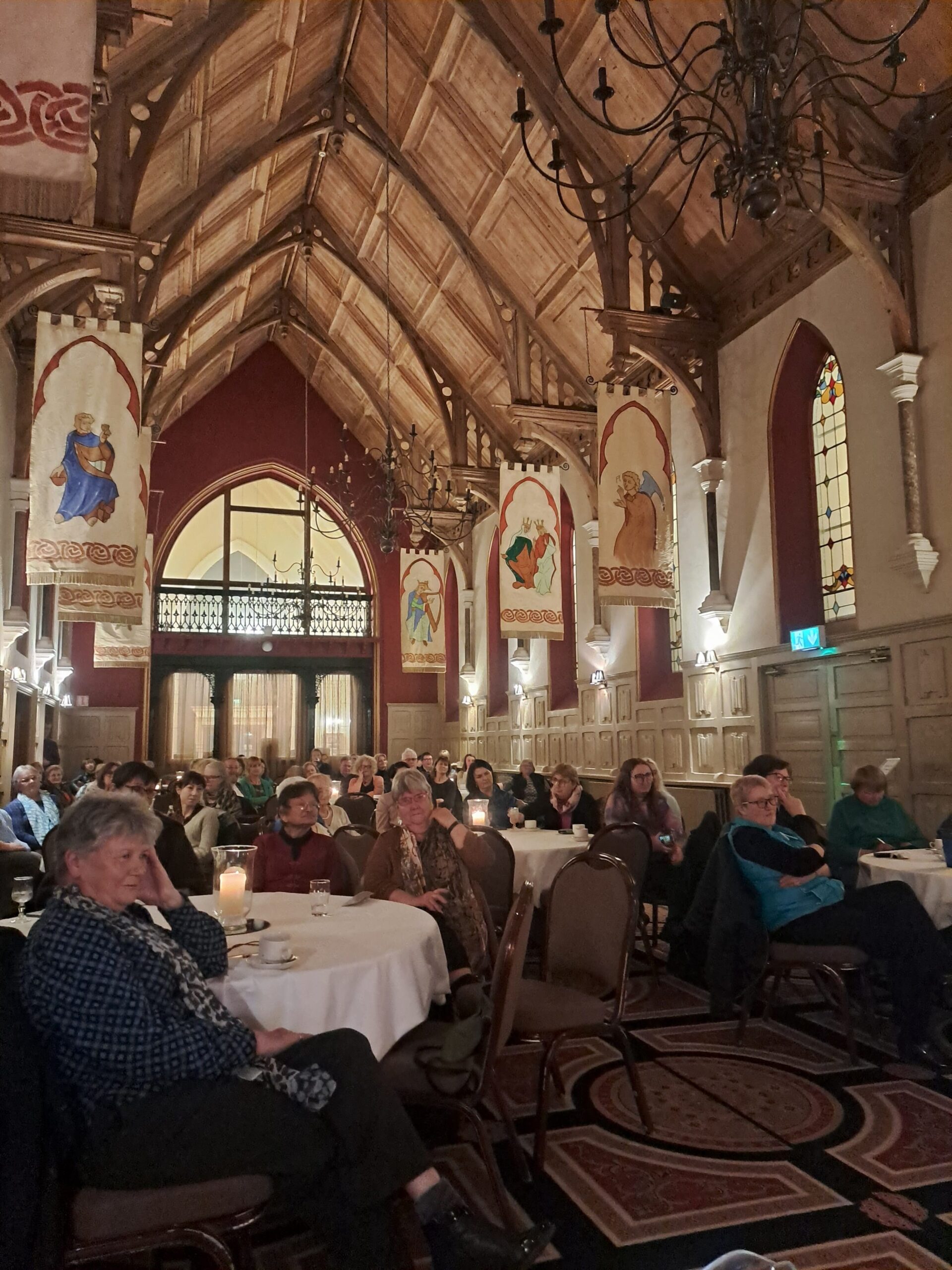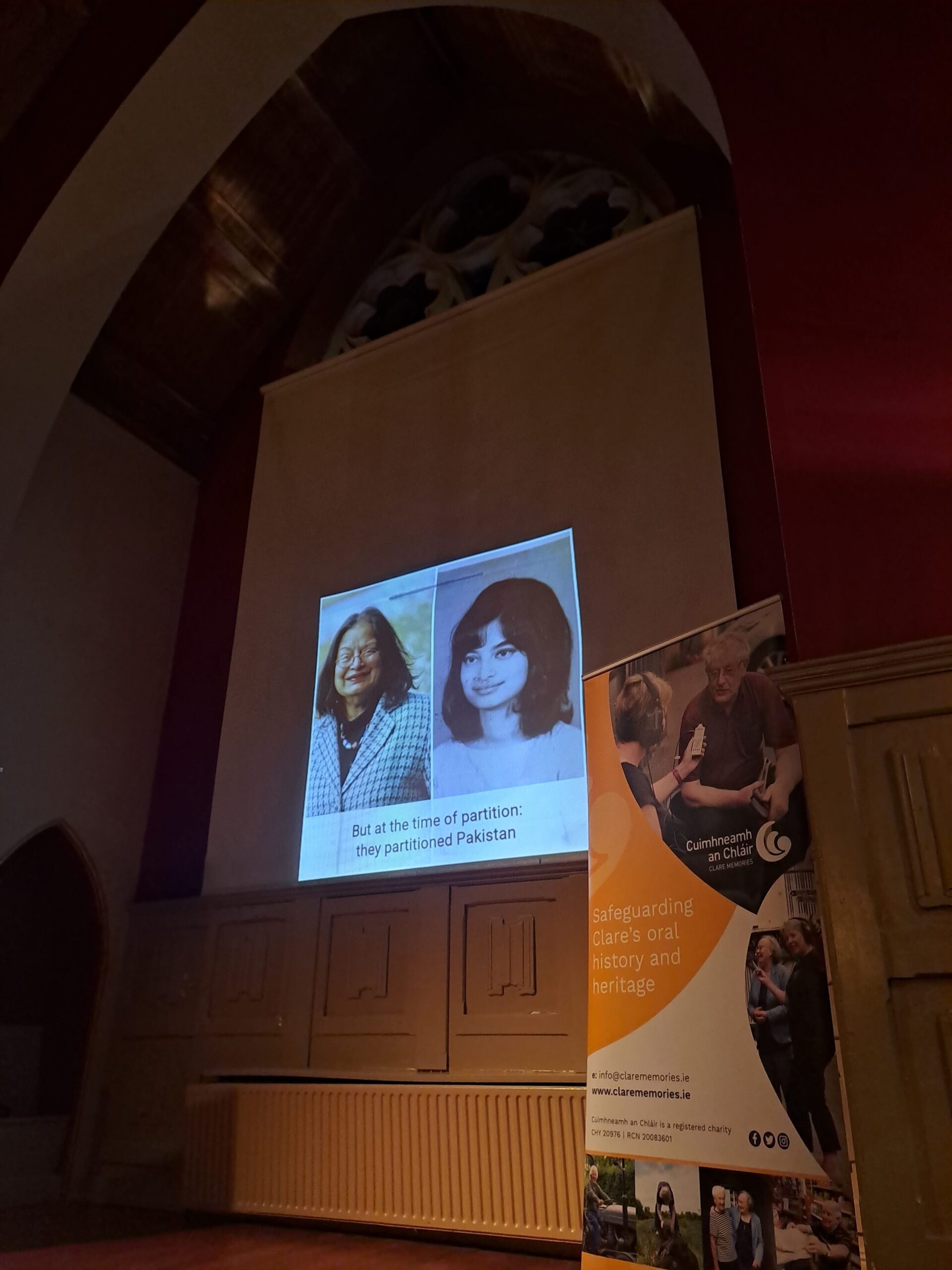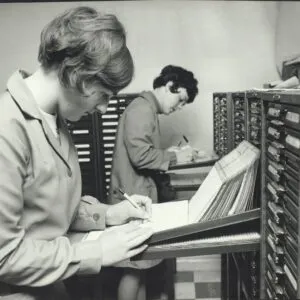The Digital Repository of Ireland (DRI) is pleased to announce that a new collection – Clare Memories Oral History Collection – has been published in the Repository through Cuimhneamh an Chláir.
Cuimhneamh an Chláir / Clare Memories was founded in 2009 with the aim of recording the people and stories of an older time in Co. Clare, and safeguarding those stories in a publicly available archive. The organisation preserves life histories and folklore by training volunteers known as cuairteóirí (from the Irish-English term ‘going on cuaird’ or social visiting). This practice is in homage to the tradition of respectful listening and conversation with the elders of a community. These volunteers are the backbone of Cuimhneamh an Chláir, ensuring that the voices and experiences of Clare women are preserved for generations to come.
As part of Cuimhneamh an Chláir’s work in gathering and archiving the oral histories of county Clare, the organisation joined DRI as a member and is currently working on ingesting its substantial archive of life interviews into the Repository to ensure long-term digitial preservation of these stories.
The first collection ingested into the Repository is Women’s Stories, which provides an insight into many aspects of the history and folklore of county Clare, including details of rural life in the 20th century; music, song and dance; folklore and superstitions; traditional cures; seasonal customs, sports, politics, social change; storytelling the role of women and family life; religious practice; the culture of visiting and many other topics.
Says Paula Carroll, Project Manager at Cuimhneamh an Chláir:
“The recent addition of the Women’s Stories collection from the Cuimhneamh an Chláir archive to the Digital Repository of Ireland showcases the wit and grit of twentieth century Clare women. It is also testament to the tireless dedication of our volunteer Cuairteoirí and the rich oral heritage we have in the Banner County.
This ingestion into the DRI makes these invaluable stories not only accessible to a wider audience, but also ensures their safekeeping for the future. We are indebted to our partner consultant archivist Clare Lanigan and the DRI for all their support.”
An example of the stories recorded and contained in the Women’s Stories collection comes from Nora Canavan, who lived in Moanreel and Doolin, county Clare. Nora was once Ireland’s oldest citizen and passed away at the age of 108 in 2016. Nora was a mother-of-seven, a grandmother-of-10, a great-grandmother-of-eight and great-great-grandmother-of-two. She was known throughout the county for her age, her faith and her handcraft skills, which included knitting.

Nora’s interviews were carried out by cuairteoir Frances Madigan on 20 April 2012 and 3 May 2012 – Nora was aged 104 at the time. In five separate recordings, Nora, spoke about her family and early life in Moanreal, including the War of Independence and the presence of Black and Tans in the area. She also talked about her school days, farm work and selling butter at Ennistymon Market. Nora detailed her wedding, marriage and family life – including the premature deaths of two of her adult children. In the final recording, Nora details seasonal traditions as well as changes in Doolin over the years.
Talking about the work of churning butter before it was brought to market, Nora gave an interesting insight into traditional superstitions associated with food production in rural Ireland in the early twentieth century:
Q. “If someone came in when you were churning, was there any superstition?”
A. “They would have to take a twist around the churn – and if they didn’t you were supposed to have the butter gone from you. ”
While not superstitious herself, Nora’s stories illustrate the intertwining of daily life in Ireland with folklore that reflects the traditions, inspirations and word-of-mouth beliefs of the era. From tales of the ‘butter witch’ – a hag disguised as a hare – to the presence of ‘wee people’, Nora’s recollection of communal churning as a key element in warding off the butter ‘being gone from you’ reflects the lore and community practices particularly prominent in rural Ireland.

Later, talking about the experience of her first taking Holy Communion, Nora recounted how she and her mother went to their local chapel – which was in a different parish to the one she attended school in. Nora then felt reticent to tell her teacher, who was preparing her school class for Communion, that she had already had her first Communion in a different parish:
“We were the farthest over house to this side, from Corofin. And my mother was going – you would have to go to the ‘stations’ they used to call it – go to different houses – when you were far away from your church.
So my mother brought me with her on this day. The priest examined me and [..] the priest said I was well able to receive holy communion [..] So I done it and I didn’t like then when I went back to school.
I didn’t like to tell the teacher.”
On International Women’s Day 2024, DRI were honoured to be invited to the launch celebration of Women’s Stories being deposited into the Repository. Taking place in the Temple Gate Hote, Ennis, over seventy women and men from the local community came together to hear a beautifully curated selection of interviews from the collection.
Maeve O’Brien, DRI Membership Manager had this to say:
“The Women’s Stories collection from Cuimhneamh an Chláir is an inspiring and thought-provoking collection of interviews that document the lives of women from Clare across generations, through different social classes, and from a diversity of backgrounds.
It was a privilege to attend the launch of Women’s Stories and learn more about the brilliant women of Clare – their stories, experiences, laughs and tears. I look forward to listening to the full collection in the Repository!”


There are many more oral history recordings to explore in the Women’s Stories collection – numbering twelve in total. Other interviews feature: Annie Corry from Tulla, Moira Garry from Cooraclare, Nan Ahern from Ennistimon, Peggy Hogan from Feakle, Mai Tuohy from Feakle, Susan Williams from Kilfenora, Bridie Morgan from Ruan, Mary Casey from Ruan, Maura McInerney from Killaloe, Susan Barrett from Inagh and Nora McMahon from Kilfenora.
These stories can be heard in excerpt form by listening to the Clare Oral History Podcast as well as the full recordings available in the Repository.
DRI are delighted to include this valuable oral history collection from Cuimhneamh an Chláir in the Repository. Other oral history collections in the Repository include: The Magdalene Oral History collection, the Irish Women at Work collection and the Life Histories and Social Change collections. You can keep up to date with all of our collections by signing up to our newsletter.






